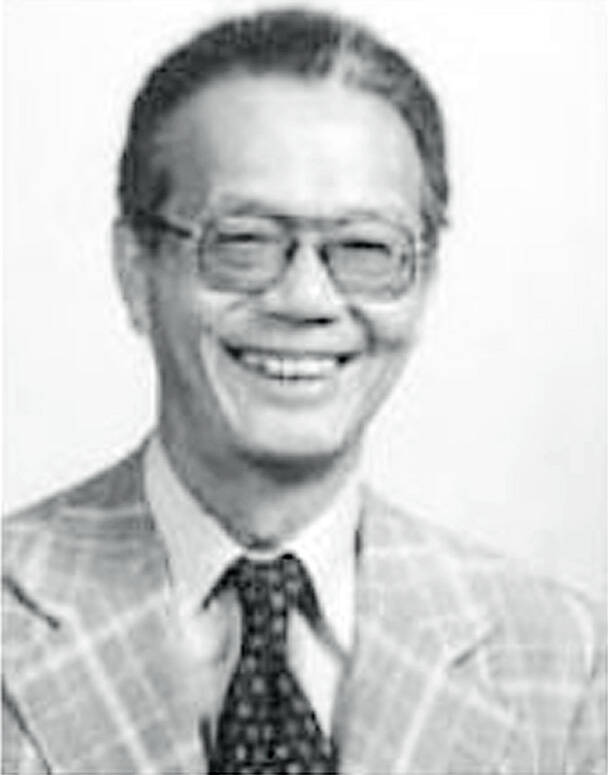Mei Tsu-lin (梅祖麟), a leading academic of historical Chinese linguistics, passed away on Oct. 14 in Ithaca, New York, Academia Sinica announced on Friday.
He was 90.
Mei was an elected member of Academia Sinica’s Institute of History and Philology since 1994.

Photo: Screen grab from Academia Sinica’s Web site
His research focused on Chinese historical grammar, Chinese historical dialectology, the morphology of Chinese characters and Sino-Tibetan comparative linguistics, according to Cornell University, where Mei taught from 1971 to 2001.
Mei’s time at Cornell saw him achieve the status of Hu Shih professor emeritus of Chinese literature and philology while chairing the university’s Department of Asian Studies and directing its East Asia Program.
Following his retirement from Cornell, Mei became a visiting professor at prestigious academic institutions around the world, including National Taiwan University and National Tsing Hua University, as well as Stanford University in California, Beijing University, the Chinese Academy of Social Science in Beijing, Tsinghua University in Beijing and Hong Kong University of Science and Technology.
Mei became president of the International Association of Chinese Linguistics in 1994 and was also a member of Taiwan’s Association of Chinese Phonology.
Academia Sinica said that Mei’s professional achievements were preceded by his prestigious education, having attained a doctorate in philosophy from Yale in 1962.
Cornell said that he received a bachelor’s degree from Oberlin College in 1954 and a master’s in mathematics from Harvard in 1955, where he also taught from 1964 to 1971.
Academia Sinica said that Mei heavily contributed to the research of modern Chinese grammar and dialectology alongside old morphology.
Mei’s efforts in tracing the grammatic and phonetic development of the Chinese language became a tool used in literary criticism, Academia Sinica said, adding that Mei also proposed that Sanskrit had an impact on modern Chinese poetry.

Taiwan has received more than US$70 million in royalties as of the end of last year from developing the F-16V jet as countries worldwide purchase or upgrade to this popular model, government and military officials said on Saturday. Taiwan funded the development of the F-16V jet and ended up the sole investor as other countries withdrew from the program. Now the F-16V is increasingly popular and countries must pay Taiwan a percentage in royalties when they purchase new F-16V aircraft or upgrade older F-16 models. The next five years are expected to be the peak for these royalties, with Taiwan potentially earning

STAY IN YOUR LANE: As the US and Israel attack Iran, the ministry has warned China not to overstep by including Taiwanese citizens in its evacuation orders The Ministry of Foreign Affairs (MOFA) yesterday rebuked a statement by China’s embassy in Israel that it would evacuate Taiwanese holders of Chinese travel documents from Israel amid the latter’s escalating conflict with Iran. Tensions have risen across the Middle East in the wake of US and Israeli airstrikes on Iran beginning Saturday. China subsequently issued an evacuation notice for its citizens. In a news release, the Chinese embassy in Israel said holders of “Taiwan compatriot permits (台胞證)” issued to Taiwanese nationals by Chinese authorities for travel to China — could register for evacuation to Egypt. In Taipei, the ministry yesterday said Taiwan

Taiwan is awaiting official notification from the US regarding the status of the Agreement on Reciprocal Trade (ART) after the US Supreme Court ruled US President Donald Trump's global tariffs unconstitutional. Speaking to reporters before a legislative hearing today, Premier Cho Jung-tai (卓榮泰) said that Taiwan's negotiation team remains focused on ensuring that the bilateral trade deal remains intact despite the legal challenge to Trump's tariff policy. "The US has pledged to notify its trade partners once the subsequent administrative and legal processes are finalized, and that certainly includes Taiwan," Cho said when asked about opposition parties’ doubts that the ART was

If China chose to invade Taiwan tomorrow, it would only have to sever three undersea fiber-optic cable clusters to cause a data blackout, Jason Hsu (許毓仁), a senior fellow at the Hudson Institute and former Chinese Nationalist Party (KMT) legislator, told a US security panel yesterday. In a Taiwan contingency, cable disruption would be one of the earliest preinvasion actions and the signal that escalation had begun, he said, adding that Taiwan’s current cable repair capabilities are insufficient. The US-China Economic and Security Review Commission (USCC) yesterday held a hearing on US-China Competition Under the Sea, with Hsu speaking on